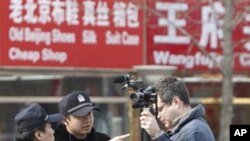China has blamed international reporters for the clashes with plainclothes and uniformed police officers, following online calls for peaceful democracy protests in two major cities, Sunday. Some journalists reporting from China now fear a media crackdown.
Foreign journalists based in China fear the government is backtracking on media freedoms introduced three years ago, for the 2008 Beijing Olympic Games. Their concern follows a series of attacks on more than a dozen foreign correspondents sent to cover pro-democracy protests at the weekend in 35 cities, including the capital Beijing and Shanghai.
Foreign ministry spokeswoman Jiang Yu refuted claims journalists suffered unprovoked assaults by plainclothes gangs of men and said police and other security forces acted lawfully.
During a 90-minute media briefing, in which she was quizzed repeatedly to explain the violent conduct of the security forces, Jiang advised journalists to follow the country's reporting laws. She denies rules have been changed since new one laws were introduced for the Beijing Olympics.
And, she was adamant that police had done their job properly, saying foreign journalists should report any alleged assaults to the local police bureaus.
One American journalist needed hospital treatment after being badly beaten by five unidentifiable men in busy Beijing shopping area, close to Tiananmen Square.
Jiang said local police who organized the security would investigate the incident, as she put it, according to law.
Other reporters were also roughed up or detained.
Some had their film footage or photos forcibly deleted by men who would not identify themselves.
VOA Beijing Bureau chief Stephanie Ho had to be rescued from a gang of men who pushed her into a shop.
Film footage and photos used in international news reports about the beatings show groups of men attacking journalists, as uniformed officers looked on.
American Ambassador to China Jon Huntsman and those from the European Union and Japan have issued statements condemning the violence and calling on Beijing to protect foreign journalists.
The reporting rules introduced before the 2008 Olympics allowed foreign media to freely interview Chinese people, so long as they have their consent.
The laws also eased travel restrictions, except to sensitive areas like Tibet.
Many of Jiang's answers about reporting seemed vague.
But she said journalists must now seek permission to report from popular landmarks in Shanghai and Beijing.
The violence and tighter restrictions follow anonymous online calls, two weeks in a row, for peaceful protests.
The economy has boomed for 20 years in China. There is not the same level of discontent as that which sparked rebellion against one-party rule in several Middle East countries.
China is spending millions of dollars on a public relations campaign to enhance its image in the eyes of the world, as it emerges as an economic and influential superpower.
Jiang was asked if the photos and film footage of Sunday's incidents -- described by many journalists as thuggery -- had had a negative impact on China's image. She refused to answer.
China Blames Protest Clashes on Foreign Media




